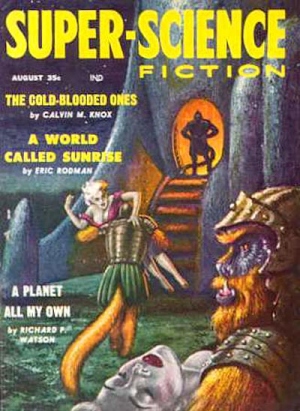Birthday Review: Alan E. Nourse’s “The Gift of Numbers”

Alan E. Nourse was born on August 11, 1928 and died on July 19, 1992. He also published stories using the names Al Edwards and Doctor X.
Alan E. Nourse received a Hugo nomination for Best Novelette for his story “Brightside Crossing” in 1956, the third year the Hugos were presented and the second time the Best Novelette Hugo was awarded. When Philip K. Dick’s novel Do Androids Dream of Electric Sheep was made into a film in 1982, the producers took the title of Nourse’s 1974 novel about underground medical services, The Bladerunner, for the Dick film. Nourse’s novel had been adapted for film in 1979 by William S. Burroughs, but the film was never made.
Nourse published “The Gift of Numbers” in Super-Science Fiction, edited by W.W. Scott in the August 1958 issue. The story was reprinted in Nourse’s 1971 collection Rx for Tomorrow and was also included in his German language collection Hospital Erde the following year. In 2012, Robert Silverberg selected the story for inclusion in the Haffner Press anthology Tales from Super-Science Fiction.
The Colonel is a low level con artist who scams ineffective bookkeeper Avery Mearns in a bar one evening. In exchange for $20 (about $170 in 2018 dollar values), the Colonel promises to trade his ability with numbers to Mearns and thereby save his job. Mearns takes the Colonel up on the offer and, naturally, that is the last he sees of the con man.
However, the Colonel is not quite the con artist that he appears and Mearns finds that he suddenly is quite effective when it comes to bookkeeping. Not only does he begin to save the company money, but he also realizes that he can skim from the company using bookkeeping tricks. While this would not have occurred to the mild-mannered Mearns who met the Colonel in the bar that evening, Mearns received some of the Colonel’s larceny along with his ability with numbers. Mearns used his abilities not only to steal from the company, but to steal other trinkets, completely unwittingly and unwillingly, until he is caught, at which time the company refused to press charges since he was bringing in more money than he was taking out. Mearns, however, began to look for the Colonel, who the police identified by several names and noted was on the lam.
Nourse didn’t only give Mearns larceny and mathematical ability. Through a means of transference which Nourse had no interest in discussing, he also gave Mearns the symptoms, if not the actual, ulcer that the Colonel had when the two men first met. It was the ulcer, more than anything else, that caused Mearns to look for the Colonel just around the same time the Colonel began seeking him out since the ulcer wasn’t the worst thing that could be transferred between the two men.
“The Gift of Numbers” is a clever and light, but not necessarily light-hearted, take on personality switching that is a common a trope in science fiction. Nourse is less concerned about how it happens than the implications it has, as well as the poetic justice that entails, which provides the story the sense of a fantasy with a moral.
Reprint reviewed in the anthology Tales from Super-Science Fiction, edited by Robert Silverberg, Haffner Press, 2012.
 Steven H Silver is a sixteen-time Hugo Award nominee and was the publisher of the Hugo-nominated fanzine Argentus as well as the editor and publisher of ISFiC Press for 8 years. He has also edited books for DAW and NESFA Press. He began publishing short fiction in 2008 and his most recently published story is “Doing Business at Hodputt’s Emporium” in Galaxy’s Edge. Steven has chaired the first Midwest Construction, Windycon three times, and the SFWA Nebula Conference 6 times, as well as serving as the Event Coordinator for SFWA. He was programming chair for Chicon 2000 and Vice Chair of Chicon 7. He has been the news editor for SF Site since 2002.
Steven H Silver is a sixteen-time Hugo Award nominee and was the publisher of the Hugo-nominated fanzine Argentus as well as the editor and publisher of ISFiC Press for 8 years. He has also edited books for DAW and NESFA Press. He began publishing short fiction in 2008 and his most recently published story is “Doing Business at Hodputt’s Emporium” in Galaxy’s Edge. Steven has chaired the first Midwest Construction, Windycon three times, and the SFWA Nebula Conference 6 times, as well as serving as the Event Coordinator for SFWA. He was programming chair for Chicon 2000 and Vice Chair of Chicon 7. He has been the news editor for SF Site since 2002.
As I recall, Steven, the producers/screenwriter of the movie actually got the title from Burroughs’ (very loose) adaptation of Nourse’s novel. Then they bought the rights to Nourse’s book as well just to make sure they didn’t get into any trouble. I also thought they used a few ideas from Burroughs adaptation (not so much plot as imagery/background) in the screenplay, though I’m not sure about that.
Happy to see a Nourse review — he was one of the few YA writers I read when I was a YA myself. (Nourse, Norton, Silverberg … not sure who else. Not “Paul French”. Not Heinlein (unless you count Orphans of the Sky). Not any Winston Juveniles that I remember.
I haven’t read much Nourse, but I did have an old second-hand copy of Scavengers in Space that I read many times. I went back to it a few years ago and it held up reasonably well as a product of its time.